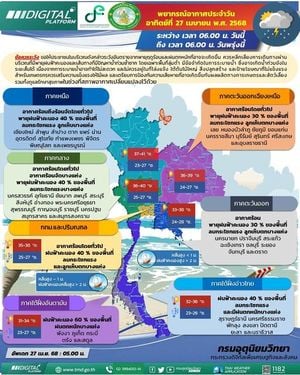Fabio Ochoa Vásquez, one of the notorious founders of the Medellín cartel, was recently released from U.S. federal prison after serving approximately 25 years of his 30-year sentence for drug trafficking. This release, announced by the U.S. Bureau of Prisons, marks the end of more than two decades of incarceration for one of the most infamous figures tied to the global cocaine trade.
At 67 years old, Ochoa's release does not just signify his freedom but also hints at the possible return to wealth and influence, especially considering his past as part of the Ochoa family, which was integral to the cartel's operations. Alongside his brothers, Jorge and Juan David, Ochoa was deeply involved with Pablo Escobar’s empire during the 1980s, when cocaine flooding the United States became rampant.
The Ochoa brothers were recognized as some of the wealthiest drug lords of their time, even securing spots on Forbes magazine’s billionaire list as early as 1987. Their operations primarily focused on establishing distribution channels for cocaine across the U.S., particularly centered around Miami, where Ochoa ran logistical operations.
The initial phase of Ochoa's legal troubles began when he voluntarily surrendered to Colombian authorities back in 1990. This was during the period when former Colombian president César Gaviria offered reduced sentences to drug traffickers who confessed and cooperated with law enforcement. Ochoa took this opportunity, leading to his early release from prison in 1996 after nearly six years. Nevertheless, he found himself back behind bars shortly thereafter when he was arrested again during “Operation Millennium” which aimed to dismantle major drug networks.
After being extradited to the United States, Ochoa faced serious charges. His Miami trial resulted from his alleged role in smuggling cocaine and participating in organized crime. Notably, he was implicated as part of the conspiracy behind the assassination of informant Barry Seal, whose life story featured prominently in the 2017 film American Made, starring Tom Cruise.
During his trial, Ochoa opted not to cooperate with prosecutors unlike many of his co-defendants, which cost him dearly; they received lighter sentences by providing information and testimony against him. The heightened security and the lengths authorities took to protect the jury from Ochoa’s notorious reputation underscored the serious nature of his case.
Now released, speculation about his financial standing abounds. Richard Gregorie, the retired assistant U.S. attorney involved in Ochoa's prosecution, remarked, "He won't be retiring a poor man, that's for sure." Reports suggest the authorities did not manage to seize all of the enormous cash reserves attributed to the Ochoa family, hinting at the likelihood of substantial wealth awaiting him upon his return to Colombia.
The resurgence of interest surrounding Ochoa's release also reflects broader concerns about drug trafficking patterns. Colombia remains the largest producer of cocaine globally, with recent analyses showing steady increases in both production and cultivation. Just last week, multinational efforts by the Colombian Navy reportedly led to the seizure of over 225 metric tons of cocaine—an indication of the continued challenges facing authorities against drug trafficking syndicates.
With Ochoa now free, he is expected to return to Colombia, where his past ties and illicit fortune could potentially re-establish him within the country's complex contemporary criminal landscapes.
While media portrayals like Narcos have romanticized the tales of these drug lords, the stark reality is layered with violence, tragedy, and the social repercussions of the narco economy, affecting countless lives across both Colombia and the United States. Ochoa’s release is yet another chapter in the storied history of the Medellín cartel, making headlines and instilling concern among those wary of the enduring drug trade.



